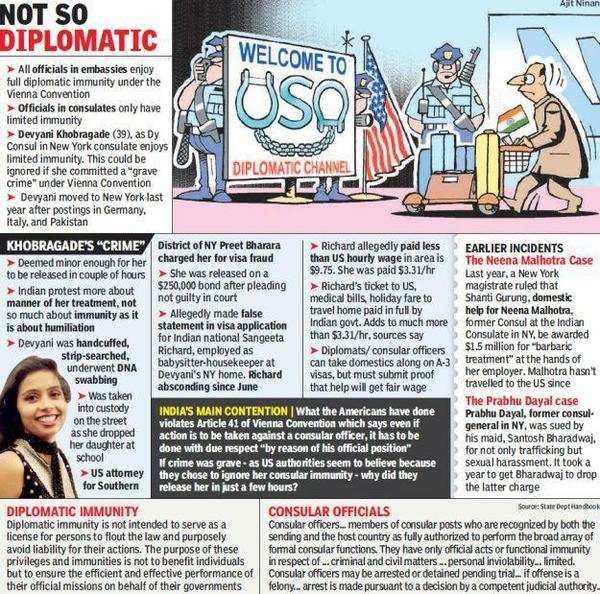- News
- India News
- Strongest Indian action against US in years
Trending
This story is from December 18, 2013
Strongest Indian action against US in years
It was over the weekend that the Indian government decided they had to take strong steps against the US for their action against Devyani Khobragade.

NEW DELHI: It was over the weekend that the Indian government decided they had to take strong steps against the US for their action against Devyani Khobragade.
Foreign secretary Sujatha Singh took the first step, summoning US ambassador Nancy Powell to lodge a strong protest. By Monday, national security advisor Shivshankar Menon described the action as “barbaric” as he and LS Speaker Meira Kumar refused to meet a group of US lawmakers.On Tuesday, the anger spread, Rahul Gandhi, Narendra Modi and Sushilkumar Shinde backing out of meetings.
It was the strongest Indian diplomatic action against the US in years. In 1971, when Washington sent a carrier group to the Bay of Bengal during the Bangladesh war, India was hurt. Since then, Indo-US ties have never been dealt such a blow. Even when former president APJ Abdul Kalam was subjected to a patdown in the US, India barely protested.
Sujatha Singh led the government action — partly because she is a woman and empathized with the diplo mat’s humiliation, and second she felt personally insulted because she was in the US meeting state department offi cials when they cleared action against Khobragade without giving her a heads up. S Jais hankar, ambassador-designate to Washington, on Tuesday consulted Khurshid and Singh on the course of action.

India will have to address the more fundamental question: What is the way forward for maids, drivers and other help who go to the US to “assist” diplomats. It is a fact that support staff like this have a tendency to stay back. Indian diplomats in the US and Europe have complained about staff disappearing, becoming illegal aliens, sometimes working for affl uent NRIs.
Maids travel to the US on A-3 visa. But they are part official employees of the government — they travel on an official passports, government pays their fare, medical costs, even part of their salaries. India wants them treated as officials and says they should travel on A-2 visas. The US refuses to accept this. As one official explains, clerical staff on A-2 visas also disappear but at least the diplomat is not charged with a crime. Maybe that could be a way forward.
The Krittika Biswas case
Krittika Biswas, a high school student, handcuffed on February 8, 2011 and taken from school for alleged “cyber bullying”. Spent 28 hrs in jail This happened even though she had diplomatic immunity, her dad Debashish Biswas was vice-consul in New York Then Indian consul general in NY as well as ambassador Meera Shankar intervened, but cops refused to free her
Foreign secretary Sujatha Singh took the first step, summoning US ambassador Nancy Powell to lodge a strong protest. By Monday, national security advisor Shivshankar Menon described the action as “barbaric” as he and LS Speaker Meira Kumar refused to meet a group of US lawmakers.On Tuesday, the anger spread, Rahul Gandhi, Narendra Modi and Sushilkumar Shinde backing out of meetings.
It was the strongest Indian diplomatic action against the US in years. In 1971, when Washington sent a carrier group to the Bay of Bengal during the Bangladesh war, India was hurt. Since then, Indo-US ties have never been dealt such a blow. Even when former president APJ Abdul Kalam was subjected to a patdown in the US, India barely protested.
Sujatha Singh led the government action — partly because she is a woman and empathized with the diplo mat’s humiliation, and second she felt personally insulted because she was in the US meeting state department offi cials when they cleared action against Khobragade without giving her a heads up. S Jais hankar, ambassador-designate to Washington, on Tuesday consulted Khurshid and Singh on the course of action.
The US action smacks of insensitivity and arrogance,” said an official. “Today, they are strip-searching a deputy consul. Tomorrow they could do the same to top Indian diplomats.” The indignation in India stems not merely from the US police action, but the understanding that the action was inconsistent with the quality of bilateral relations. Moreover, US diplomats in India enjoy greater privileges than Indian diplomats in the US. Khobragade’s maid went missing in June, which was when she filed a complaint with New York Police. After initially refusing to look for the maid, police prosecuted the diplomat.

India will have to address the more fundamental question: What is the way forward for maids, drivers and other help who go to the US to “assist” diplomats. It is a fact that support staff like this have a tendency to stay back. Indian diplomats in the US and Europe have complained about staff disappearing, becoming illegal aliens, sometimes working for affl uent NRIs.
Maids travel to the US on A-3 visa. But they are part official employees of the government — they travel on an official passports, government pays their fare, medical costs, even part of their salaries. India wants them treated as officials and says they should travel on A-2 visas. The US refuses to accept this. As one official explains, clerical staff on A-2 visas also disappear but at least the diplomat is not charged with a crime. Maybe that could be a way forward.
The Krittika Biswas case
Krittika Biswas, a high school student, handcuffed on February 8, 2011 and taken from school for alleged “cyber bullying”. Spent 28 hrs in jail This happened even though she had diplomatic immunity, her dad Debashish Biswas was vice-consul in New York Then Indian consul general in NY as well as ambassador Meera Shankar intervened, but cops refused to free her
End of Article
FOLLOW US ON SOCIAL MEDIA










